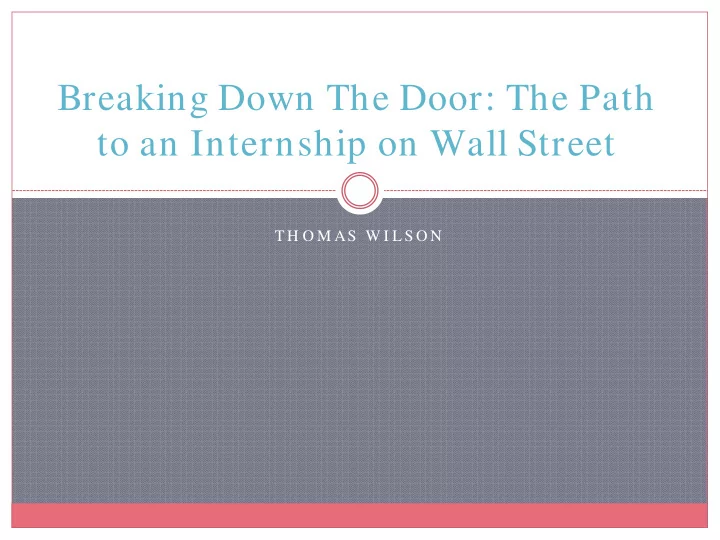

Breaking Down The Door: The Path to an Internship on Wall Street T H O M AS W I LS O N
Who I Am Past UCSD student and current student of Cornell University UCSD Activities FPN UIS SFIC Prospect Journal Rising Leaders in Economics Cornell Activities Cornell Alpha Fund Resident Advisor Career Services Advisor Employment: StepStone Group – Private Equity Barclays Capital – Investment Banking Division
Why Am I Here Today?
Where I Started Originally a Political Science major No interest in Finance Attended a UIS meeting and took control of PI Called: A UCSD Alum Read: Mergers and Inquisitions Built: A Network
The Freshman Year: Developing the Action Plan 1) Build a Network 2) Dive into the deep end: A Crash Course on Finance Careers 3) Build a Network 4) Become Conversant in Finance 5) Build a Network 6) Find a Mentor 7) Build a Network 8) Find an Internship
Building a Network The most important skill and asset you can develop Caveat Emptor: You bear all of the risk for half the return Networking is dating. Come to your first date with: Intelligent, thought-provoking questions Polished and groomed mannerisms and language Attention to audience Due Diligence Do not ask for a job Know your story and develop your “elevator pitch” Record your conversations Assess your performance. Did you hit it off with him / her? What were the take-aways? Did you learn about the industry? How to enter the industry? What a day on the job is like? Do Not Burn Bridges
How To Learn the Industry Lingo Build a Network Your networking conversations will yield foreign terminology. Write it down! Ask your mentors (more on this later) to define terms while speaking with you Never ask a lukewarm contact Read Your two greatest assets are time and your network. Use your time to self educate. The WSJ FT Seeking Alpha The Deal Pipeline (For IB) Watch On top of reading, watching quality programs will enhance your acumen Bloomberg CNBC CNN Train Invest in training programs Pony Up The easiest way to demonstrate interest is to put your own skin in the game
Finding a Mentor: The Two-Tiered Approach It is important to have both a junior and senior mentor A junior mentor will strike a balance between a friend and business contact Ask them more penetrating questions Ask them for additional industry contacts Mirror their process. Typically, if it worked for them, it will work for you A senior mentor will be far more professional Play it safe Listen to how they describe the industry Seek long term career advice Ensure that both mentors are currently working in industry. Avoid your buddy that is a year older
Find An Internship Finding an internship is the easiest way to ensure employment after graduation It is never too early to search Interview early and often Practice your interview protocol often Leverage your network
Personal Habits: Professional Best Practices Daily Habits: Read one article in each broader industry vertical Read 4 – 5 articles in industry of interest Watch 1 hour of financial news Read the front page of CNN Know the broader market data and what drives performance currently Dress for success Weekly Habits: Source 2 investment ideas Review macroeconomic data released Summarize market events Create monthly, quarterly, and yearly as well Catch up with one old contact Reach out to one new contact Own one new financial concept Finish one book Finish two academic journal articles
Questions? Contact Information: Name: Thomas Wilson Email: tjw77@cornell.edu
Recommend
More recommend